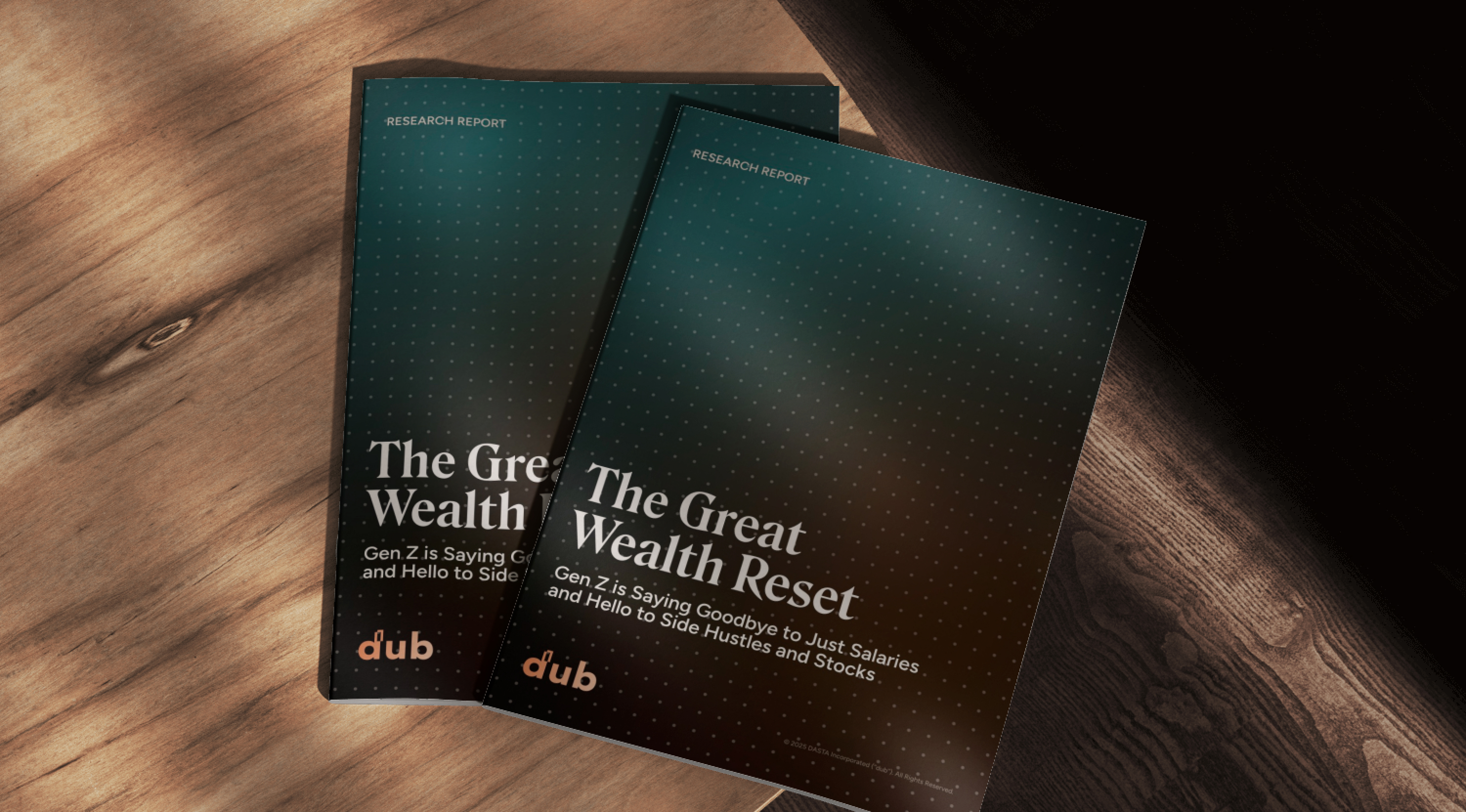"This material is provided for informational purposes only and is not intended as, and may not be relied on in any manner as legal, investment advice, a recommendation, or an offer to sell, a solicitation of an offer to purchase or a recommendation of any interest in any security offered by DASTA Incorporated (DBA dub or its affiliates (together “dub”)). Images and video content are shown for illustrative purposes only and are shown to reflect user experience and features available on dub. Past performance is not indicative of future results. Advisory services provided by DASTA Investment, LLC (“DASTA Investments”), an SEC-registered investment adviser. Brokerage services provided to clients of DASTA Investments by APEX Clearing Corporation (“Apex”), an SEC-registered broker-dealer and member of FINRA/SIPC. The registrations and memberships above in no way imply that the SEC, FINRA, or SIPC has endorsed the entities, products or services discussed herein. Additional Information is available upon request. © 2022 DASTA Incorporated. All Rights Reserved."
© 2025 DASTA Incorporated (“dub”). All Rights Reserved.
This content is provided for informational purposes only and is not intended as and may not be relied on in any manner as investment advice, a recommendation of any interest in any security offered on dub. All investments involve risk, including the possible loss of principal. Past performance does not guarantee future results, and investors should consider their own investment goals, risk tolerance, and financial situation before investing. The information contained herein is subject to change. The dub app is owned and operated by DASTA Inc. Advisory services provided by dub Advisors, LLC, an SEC-registered investment adviser. Brokerage services provided by DASTA Financial, LLC, to retail customers for US-listed, registered securities and ETFs on a self-directed basis. Clearing services are provided by APEX Clearing Corporation (”APEX”). Both DASTA Financial and APEX are SEC-registered broker-dealers and members of Financial Industry Regulatory Authority (“FINRA”) and Securities Investor Protection Corporation (“SIPC”). The registrations and memberships above in no way imply that the SEC, FINRA, or SIPC has endorsed the entities, products or services discussed herein. © 2025 DASTA Inc. All Rights Reserved.
1 Source: https://io-fund.com/broad-market/financial-analysis/retail-investors-market-losse
2 The clips featured are excerpts from a live, unscripted podcast featuring our CEO. This content was produced during an interactive session without a pre-written script, and the opinions, comments, and insights expressed are those of the speaker at that moment. They do not necessarily reflect the official views or policies of dub. This material is provided for informational purposes only and should not be construed as investment advice or an official endorsement by dub. Viewers are encouraged to conduct their own research before making any decisions based on this content.
This content is provided for informational purposes only and is not intended as and may not be relied on in any manner as investment advice, a recommendation of any interest in any security offered on dub. All investments involve risk, including the possible loss of principal. Past performance does not guarantee future results, and investors should consider their own investment goals, risk tolerance, and financial situation before investing. The information contained herein is subject to change. The dub app is owned and operated by DASTA Inc. Advisory services provided by dub Advisors, LLC, an SEC-registered investment adviser. Brokerage services provided by DASTA Financial, LLC, to retail customers for US-listed, registered securities and ETFs on a self-directed basis. Clearing services are provided by APEX Clearing Corporation (”APEX”). Both DASTA Financial and APEX are SEC-registered broker-dealers and members of Financial Industry Regulatory Authority (“FINRA”) and Securities Investor Protection Corporation (“SIPC”). The registrations and memberships above in no way imply that the SEC, FINRA, or SIPC has endorsed the entities, products or services discussed herein. © 2025 DASTA Inc. All Rights Reserved.
1 Source: https://io-fund.com/broad-market/financial-analysis/retail-investors-market-losse
2 The clips featured are excerpts from a live, unscripted podcast featuring our CEO. This content was produced during an interactive session without a pre-written script, and the opinions, comments, and insights expressed are those of the speaker at that moment. They do not necessarily reflect the official views or policies of dub. This material is provided for informational purposes only and should not be construed as investment advice or an official endorsement by dub. Viewers are encouraged to conduct their own research before making any decisions based on this content.

